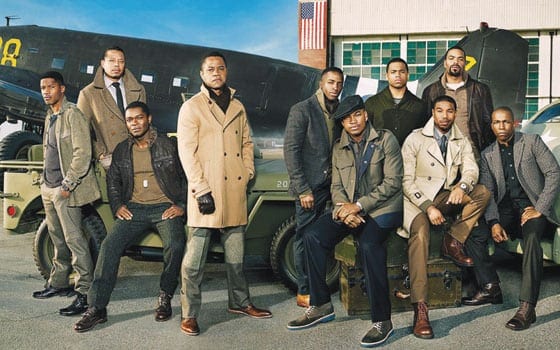
The cast of “Red Tails.” (Photo courtesy of Lucasfilm Ltd.)
— Col. Charles McGee, “Red Tails” technical consultant and surviving member of the Tuskegee Airmen
Last week, I attended the New York premiere of a new George Lucas film about the heroic exploits of the all-black fighter pilot squadron that helped America defeat the Nazis in World War II. I am not in the business of promoting new movies. But, there are several reasons that compel me to highlight the release of “Red Tails,” the story of the pioneering Tuskegee Airmen.
First, the movie has a virtually all-black cast with black male heroes — a rare depiction by Hollywood. Cuba Gooding Jr., Terrence Howard, Nate Parker, David Oyelowo and Ne-Yo all play key roles. Lucas has said that the black theme and black cast were major reasons Hollywood repeatedly declined to back the film.
He struggled 23 years to get major studio financing. “I showed it to all of them,” he said, “and they said no, we don’t know how to market a movie like this.” He wound up pouring $93 million of his own money into the project.
The second reason I am excited about this film is that recent comments by political candidates denigrating the African American community — and reviving outdated stereotypes — make it more important now than ever to spotlight the historic contributions and public service of black Americans.
In just the last few weeks, two presidential candidates, Rick Santorum and Newt Gingrich, have perpetuated false and destructive racial stereotypes in desperate attempts to score political points. In a discussion of social assistance programs, Santorum said he doesn’t want to “make black people’s lives better by giving them someone else’s money.” Santorum’s appalling comment implied that people of color are a drain on resources mainly provided by whites, even though about 70 percent of food stamp recipients are white.
Santorum’s statement was followed a few days later by a comment from Gingrich that “African Americans should demand pay checks not food stamps.” Gingrich has called Barack Obama “The best food stamp president in American history.”
We are outraged by the comments of both candidates and denounced them in separate statements. The fact is, social safety net programs serve families in dire circumstances from all walks of life. Many of those who now find themselves in need, whatever their ethnic background, are the very people who have paid into these programs and made sacrifices to support their families and our nation throughout their working lives. This brings me back to the Tuskegee Airmen.
In the 1940s, before our armed forces were integrated, the Tuskegee Airmen became the first black aviators in the United States military. They were trained at Tuskegee Institute, now Tuskegee University in Alabama. Despite discrimination during World War II, these brilliant airmen fought fascism abroad and returned to fight racism back home.
Lucas teamed with black co-executive producer, Charles Floyd Johnson, and black director, Anthony Hemingway, to create a film they all hope will inspire a new generation of African American youth. The message of the movie — and that of the Tuskegee Airmen — is clear: We have the power to overcome any barrier to serve our nation and achieve our dreams. One movie won’t solve the problem, but we think it’s an important step in the right direction.
Marc H. Morial is president and CEO of the National Urban League.


![Banner [Virtual] Art Gallery](https://baystatebanner.com/wp-content/uploads/2024/04/Cagen-Luse_Men-at-store-e1713991226112-150x150.jpg)



